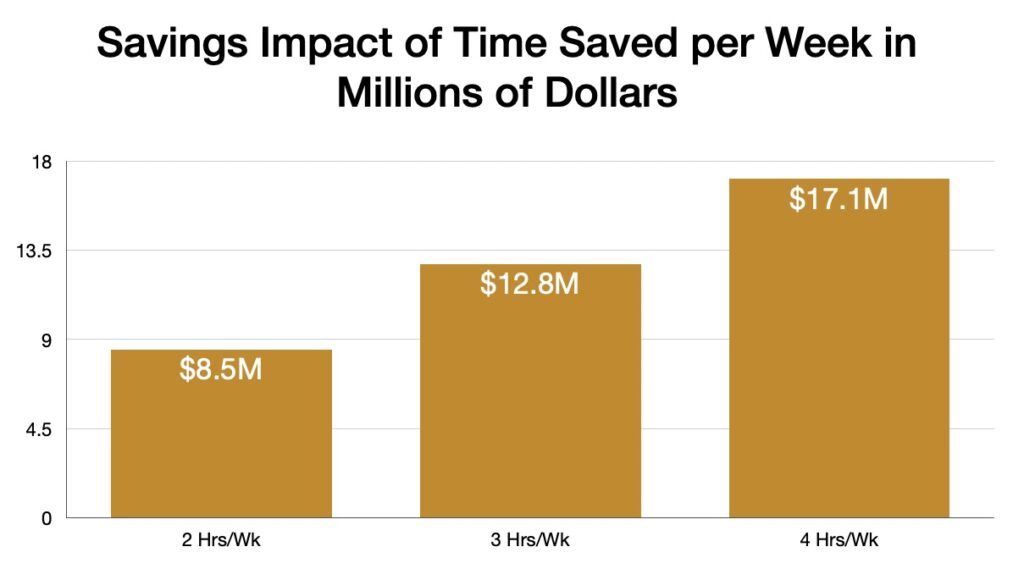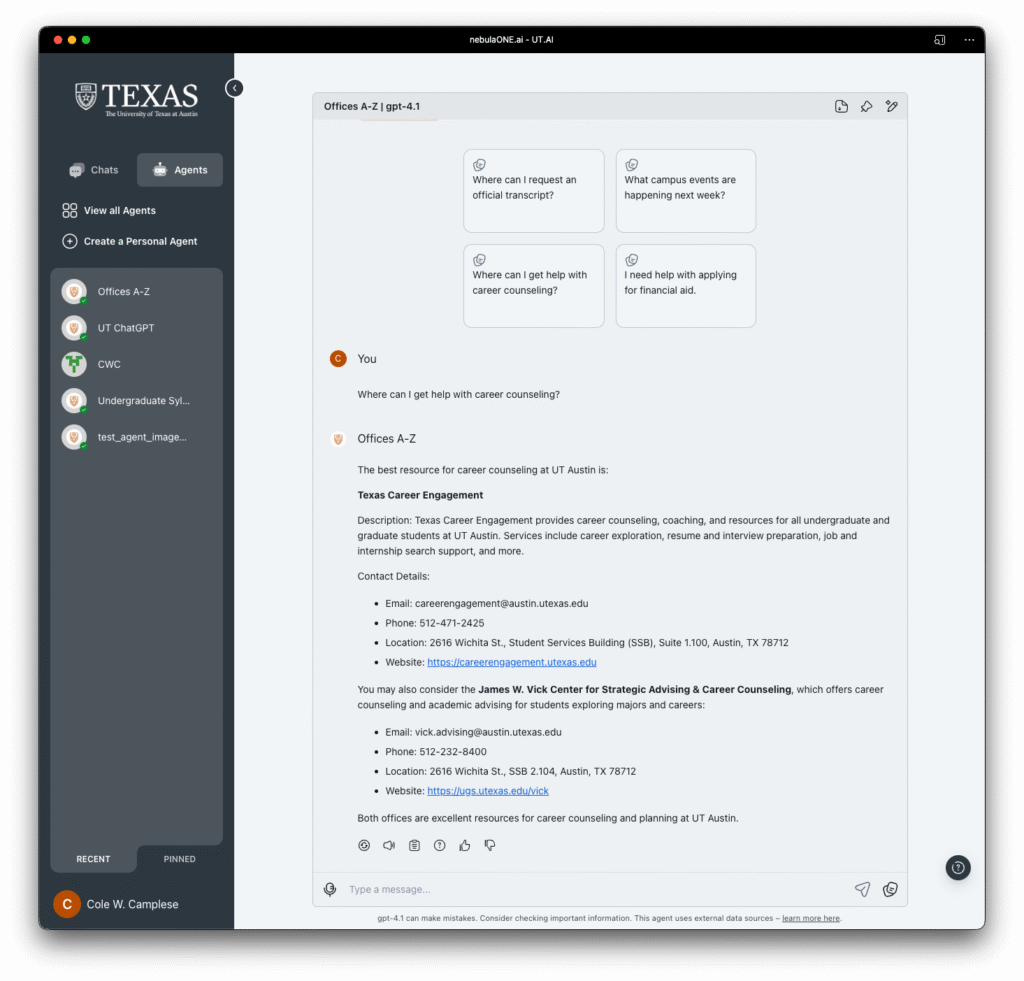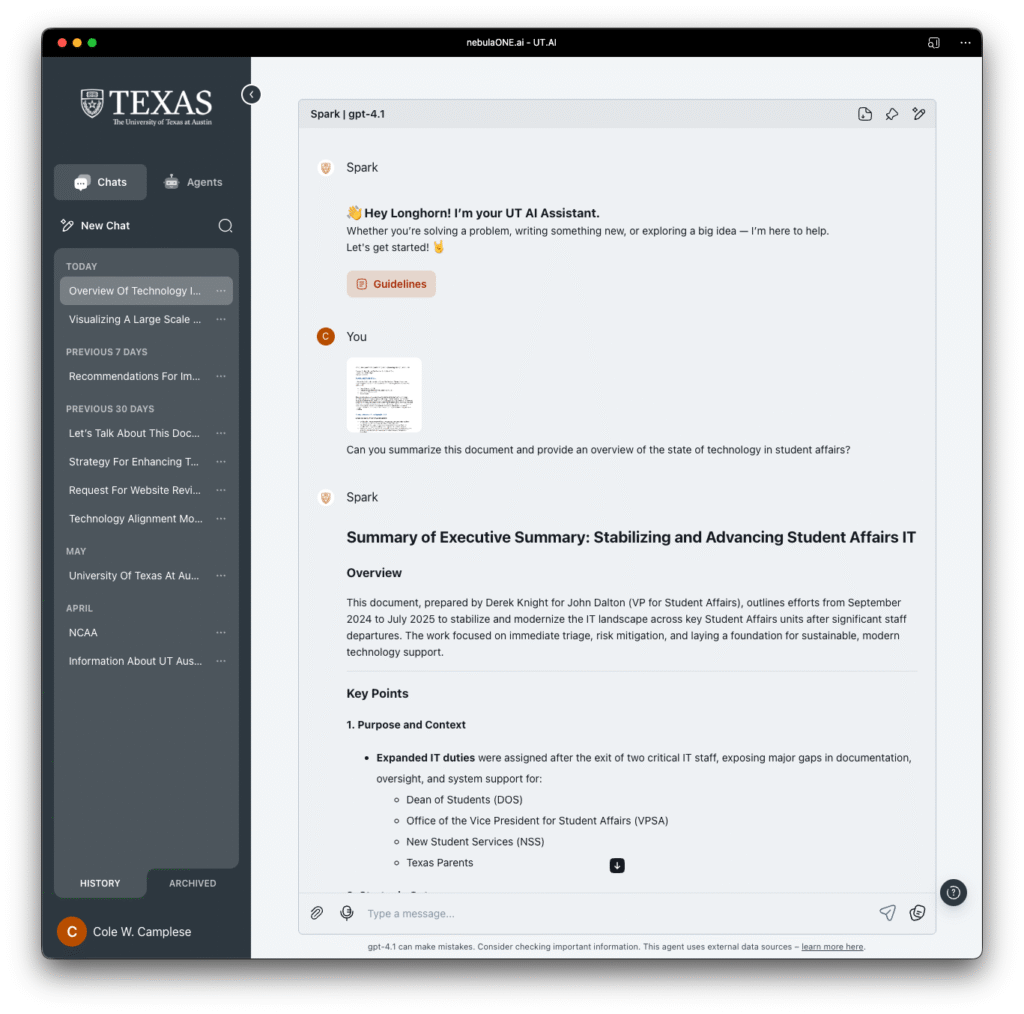I’m excited to share two leadership updates that position us better to be a leader in AI innovation while strengthening our commitment to teaching, learning, accessibility, and digital adoption across campus.
Mario Guerra Jr. Promoted to Associate Vice President, AI Platforms & Innovation
Mario Guerra Jr. will transition from Director of Enterprise Learning Technology into a newly created role as Associate Vice President for AI Platforms & Innovation.
In this role, Mario will build and lead UT.AI Studio, our flagship AI innovation program that brings together enterprise platform development, student talent cultivation, and strategic corporate partnerships. This promotion recognizes Mario’s vision and leadership in emerging technologies and reflects our commitment to moving with urgency and intention in advancing AI across the university. Mario will oversee:
- AI Platform Engineering: Enterprise AI platforms serving the UT community, including UT Spark, UT Sage, Microsoft 365 Copilot, and custom AI agents
- UT.AI Academy: A student talent development program training more than 100 students annually through industry certifications and real-world project experience
- Corporate Partnerships: Strategic relationships with technology partners, including our anchor partnership with Dell Technologies
Under Mario’s leadership, we will continue to distinguish ourselves as a national leader in higher-education AI—not only by deploying technology, but by transforming how we teach, learn, conduct research, and operate as an institution.
New Role: Associate Vice President, Enterprise Initiatives & Instructional Technology
This AVP will lead our technology-enabled learning ecosystem while driving digital adoption across campus and overseeing major, cross-cutting institutional initiatives. The role brings together instructional technology, accessibility, learning environments, and enterprise program execution under a single strategic leader.
This AVP will be responsible for:
- Instructional Technology Solutions: Canvas LMS, instructional tools, faculty engagement, and teaching innovation
- Digital Accessibility Services: Accessible course design, universal design for learning, and inclusive pedagogy
- Learning Spaces & Educational Environments: Technology strategy for classrooms, learning spaces, and active learning environments
- Digital Adoption & Campus Dexterity: Building faculty and staff fluency with Microsoft 365, Canvas, AI platforms, and learning technologies
- Enterprise Program Execution: Leading major CIO-sponsored transformation initiatives that span organizational boundaries
Critically, this AVP will partner closely with Mario and the UT.AI Studio team to translate AI platform innovation into faculty- and staff-facing programs, training, and support, ensuring our AI investments result in meaningful, scalable adoption across campus.
WHY THIS MATTERS
Artificial intelligence is transforming higher education at an unprecedented speed. This leadership realignment reflects our commitment to lead that transformation with both bold vision and responsible execution.
By establishing focused executive leadership for AI platforms and innovation and for instructional technology and digital adoption, we ensure each area receives the strategic attention, resources, and accountability it requires.
Mario’s elevation to AVP recognizes the critical importance of AI to UT Austin’s institutional future. The creation of a second AVP role ensures we continue advancing excellence in teaching and learning, while strengthening digital fluency, accessibility, and adoption across campus.
These are deliberate investments in our ability to:
- Serve more than 50,000 students
- Enable faculty innovation at scale
- Position UT Austin as a national model for AI in higher education
WHAT’S NEXT
The new Associate Vice President for Enterprise Initiatives & Instructional Technology position will be posted on February 4.
We are seeking a relationship-driven leader with:
- Deep instructional technology expertise
- Experience as an Associate Vice President, CIO, or Deputy CIO
- A strong track record in digital adoption and change leadership
- A passion for faculty engagement and inclusive learning environments
I’m grateful to Mario for his leadership and vision, and excited about the future we are building together. Please join me in congratulating him on this well-deserved promotion.


